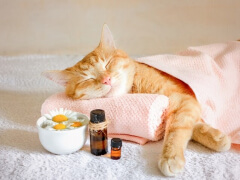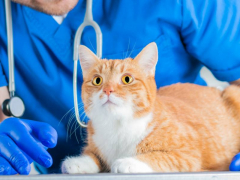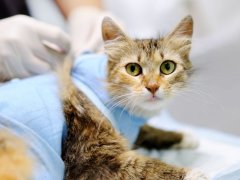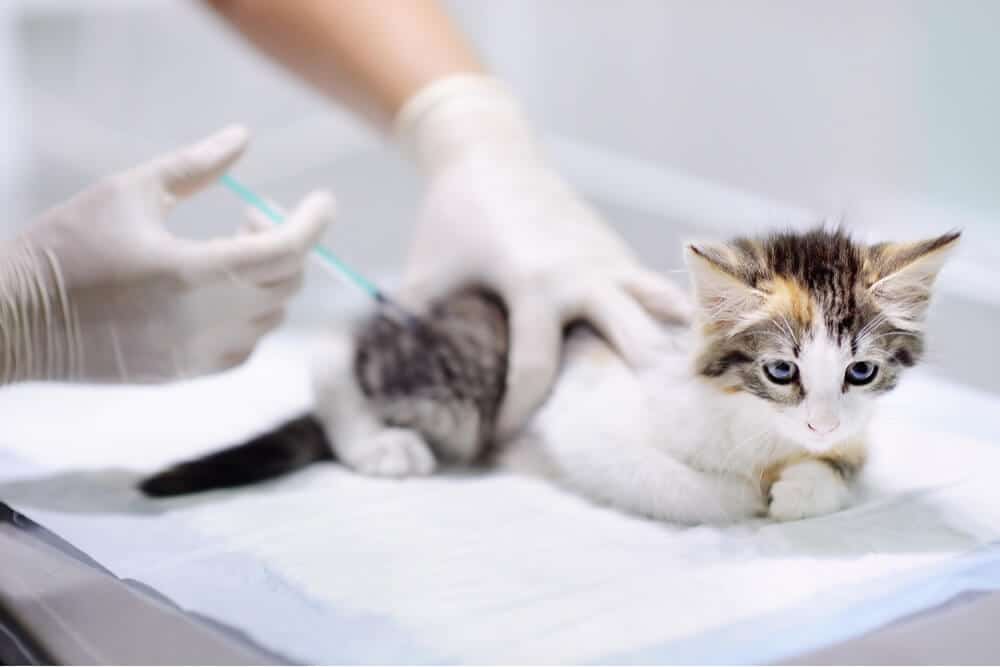
Vaccinations are an important part of keeping your cat safe and healthy. In this article, we will cover some common questions: what are vaccines, how do they work, which vaccines does your cat need, and what can you expect after your cat is vaccinated?
What Are Cat Vaccinations?
Vaccines (also called immunizations or shots) help prevent a cat from contracting contagious infectious diseases. Vaccines are made from viruses or bacteria that have been attenuated (modified to not cause disease) or killed so that they are safe to administer but still able to trigger an immune response.
Vaccines are injected underneath the cat’s skin or sometimes given intranasally (a liquid in the nose). The vaccines stimulate the cat’s immune system to mount a response against the disease-causing agents without causing illness since they contain only harmless or already killed particles.
Seeing these foreign particles will cause the immune system to produce antibodies against that virus or bacterial strain. If the cat is ever exposed to the disease in the future, production of these antibodies will increase dramatically and fight off the infection before it causes significant illness.
Vaccines are recommended for all cats and kittens, including both outdoor and indoor cats. In the United States, the American Association of Feline Practitioners (AAFP) oversees a Feline Vaccination Advisory Panel, which periodically reviews vaccination research and offers recommendations and guidelines for all cats.
The AAFP Feline Vaccination Advisory Panel last revised its vaccination guidelines for cats in 2020.
What Vaccines do Cats Need?
Although vaccinations are recommended for all cats and kittens, every cat does not necessarily need every vaccine available. Some vaccines are called “core” vaccines, meaning that they are recommended for all cats and kittens, regardless of whether they live indoors or outdoors.
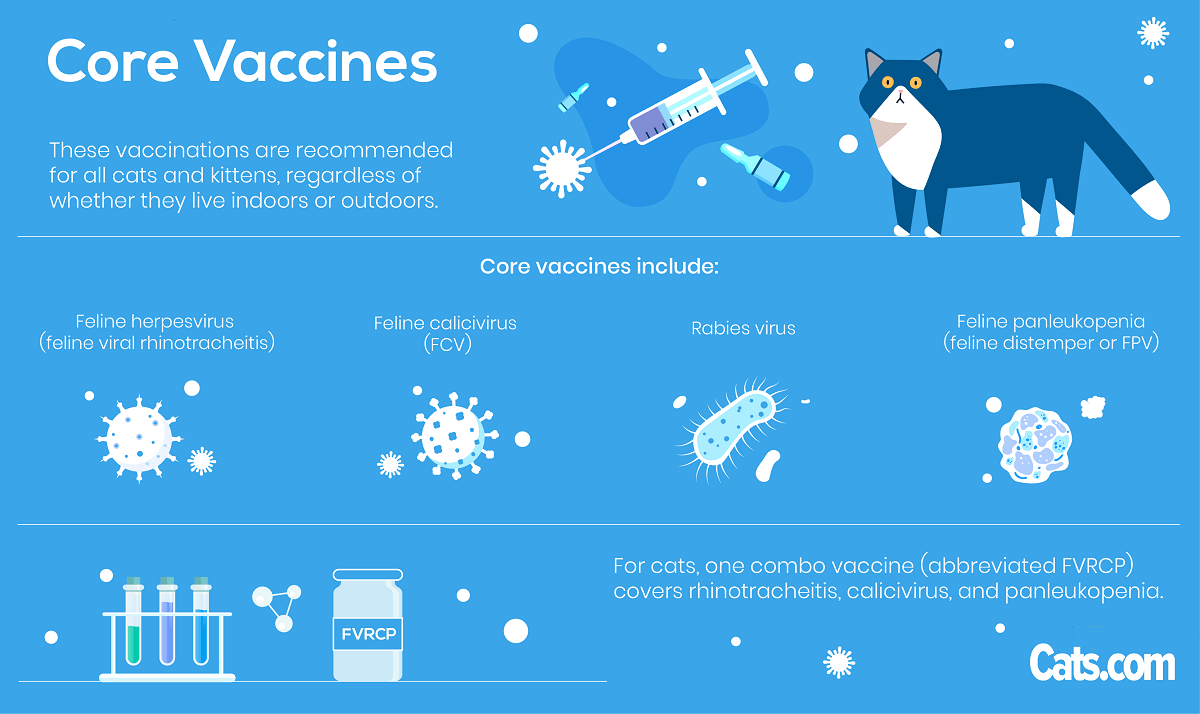
Core Vaccines for Cats Include:
- Feline panleukopenia (feline distemper or FPV)
- Feline herpesvirus (feline viral rhinotracheitis)
- Feline calicivirus (FCV)
- Rabies virus
- Feline leukemia virus (FeLV) – for cats less than a year old
Fortunately, one combo vaccine (abbreviated FVRCP) covers rhinotracheitis, calicivirus, and panleukopenia. The FeLV vaccine is recommended for kittens since they are more susceptible to the disease than adult cats.
Other vaccines are considered “non-core,” meaning they are recommended for some cats, but other cats might not need them.
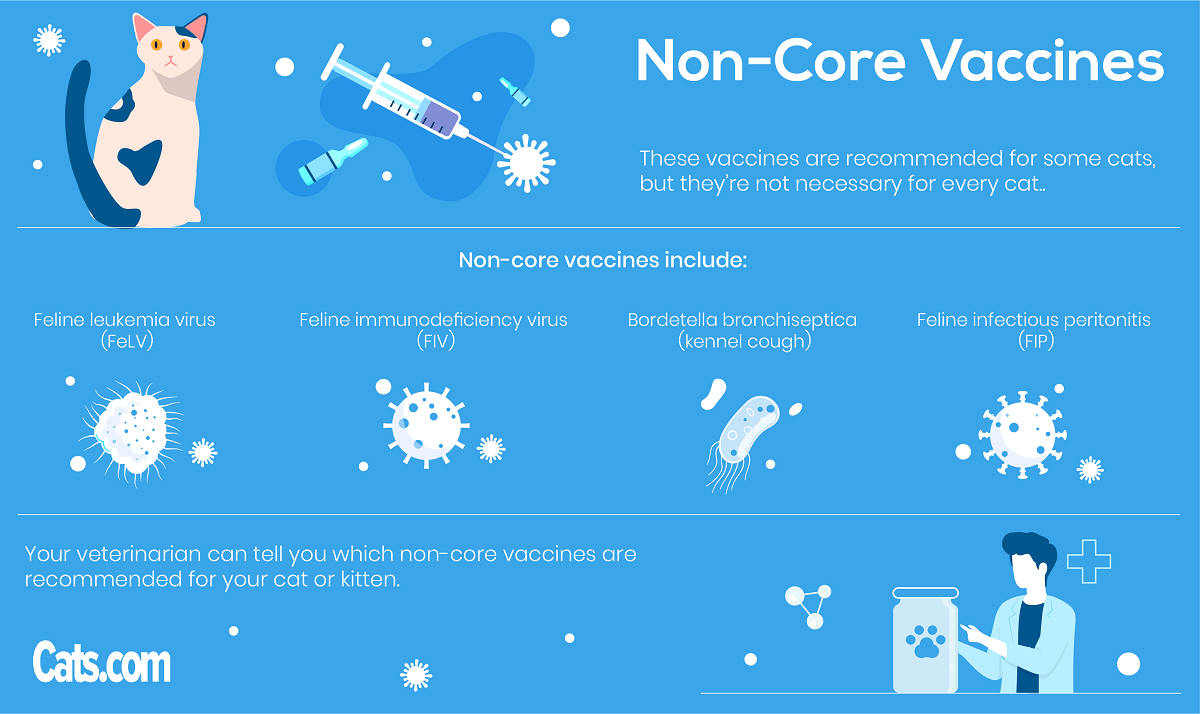
Non-Core Vaccines Include:
- Feline leukemia virus (FeLV) – for cats older than 1 year
- Feline immunodeficiency virus (FIV)
- Bordetella bronchiseptica (kennel cough)
- Chlamydia felis (upper respiratory infection)
- Feline infectious peritonitis (FIP)
Your veterinarian can tell you which non-core vaccines are recommended for your cat or kitten based on your cat’s lifestyle, age, exposure risk, and health status. Your veterinarian may not recommend continued FeLV vaccination after a year of age for an indoor-only cat that lives alone or has no FeLV-infected housemates.
It is important to note that, although a vaccine for feline immunodeficiency virus (FIV) was once available, its effectiveness was questionable and the vaccine is no longer produced or distributed in North America. Vaccination against FIV is no longer recommended by the AAFP.
Additionally, although a vaccine for feline infectious peritonitis (FIP) exists, the AAFP does not recommend vaccination for FIP. Vaccination against Bordetella bronchiseptica and Chlamydia felis is uncommon in cats. These vaccines are generally reserved for cats living in high-risk environments like shelters with a history of outbreaks of upper respiratory infections due to these bacteria.
What To Expect After Cat Vaccinations?
After your cat receives vaccines, she might be a little sore at the injection site for a few days. The feeling is likely similar to what people feel after getting a flu vaccine.
It’s best to avoid touching your cat in the area where she was injected with the vaccine. Some cats are a little sleepy or lazy after getting shots, but this generally goes away on its own by the next day.
Cat Vaccination Side Effects
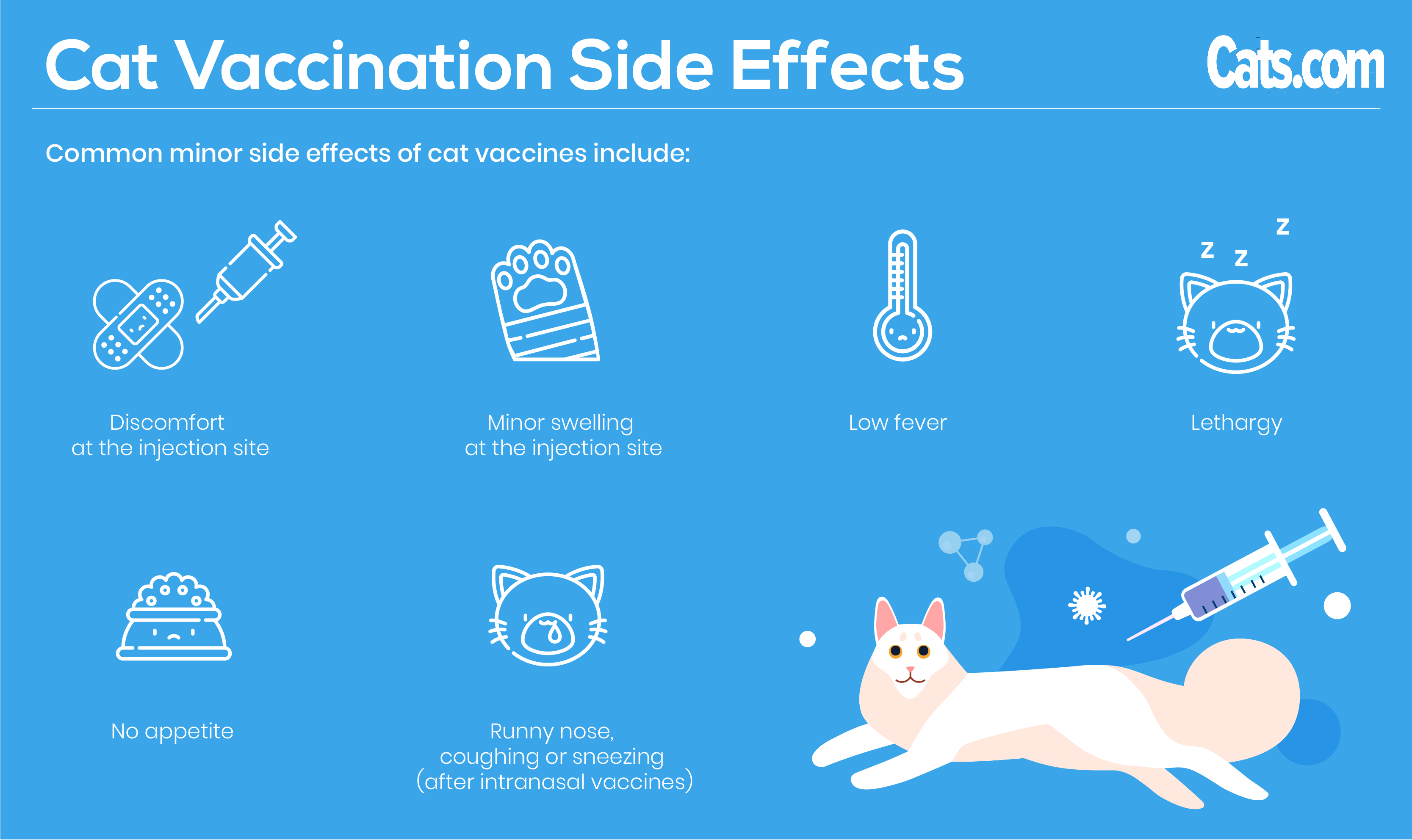
Cat vaccines, although extremely safe, do carry some risk of side effects. It’s good to familiarize yourself with the common side effects of cat vaccines so you can watch out for anything abnormal. These symptoms should be mild and last less than a day or two.
Some common minor side effects of cat vaccines include:
- Discomfort at the injection site
- Minor swelling (a lump) at the injection site
- Low fever (a cat’s normal temperature ranges from 100.5 to 102.5 degrees Fahrenheit)
- Lethargy (low energy)
- No appetite
- Runny nose, coughing or sneezing (after intranasal vaccines)
Sometimes cats experience a more serious adverse reaction to vaccinations.
A serious allergic reaction, called anaphylaxis, can cause severe, life-threatening symptoms. Anaphylactic reactions to vaccines are rare in cats, occurring in approximately 1 to 10 of every 10,0000 vaccines administered. Such reactions usually happen soon after the cat receives the vaccine.
If your cat develops any of the following symptoms within a few hours of getting vaccines, call your veterinarian or an emergency veterinary hospital:
- Hives (raised bumps on the skin)
- Facial swelling
- Difficulty breathing
- Vomiting
- Diarrhea
- Weakness
- Collapse
If your cat experiences an allergic reaction to vaccines, it doesn’t necessarily mean they can never be vaccinated again. Your veterinarian will work with you to determine a plan for future vaccines. Such plans may include spacing vaccines out, administering a premedication before vaccines to prevent a reaction, or in some cases, not giving the vaccine again.
Another serious adverse vaccine reaction that is seen in cats is called feline injection-site sarcomas (FISS).
FISS are rare, occurring in approximately 1 out of every 10,000 to 30,000 vaccinations. FISS are cancerous tumors that develop at the injection site of vaccines, microchips, long-acting steroids, or other drugs. These tumors can occur just a few months after injection or up to 10 years later.
If your cat develops a lump at the site of the vaccine, tell your veterinarian right away. Most lumps go away on their own and do not go on to become FISS, but your veterinarian will want to keep a close eye on any lumps that pop up after your cat receives vaccines.
